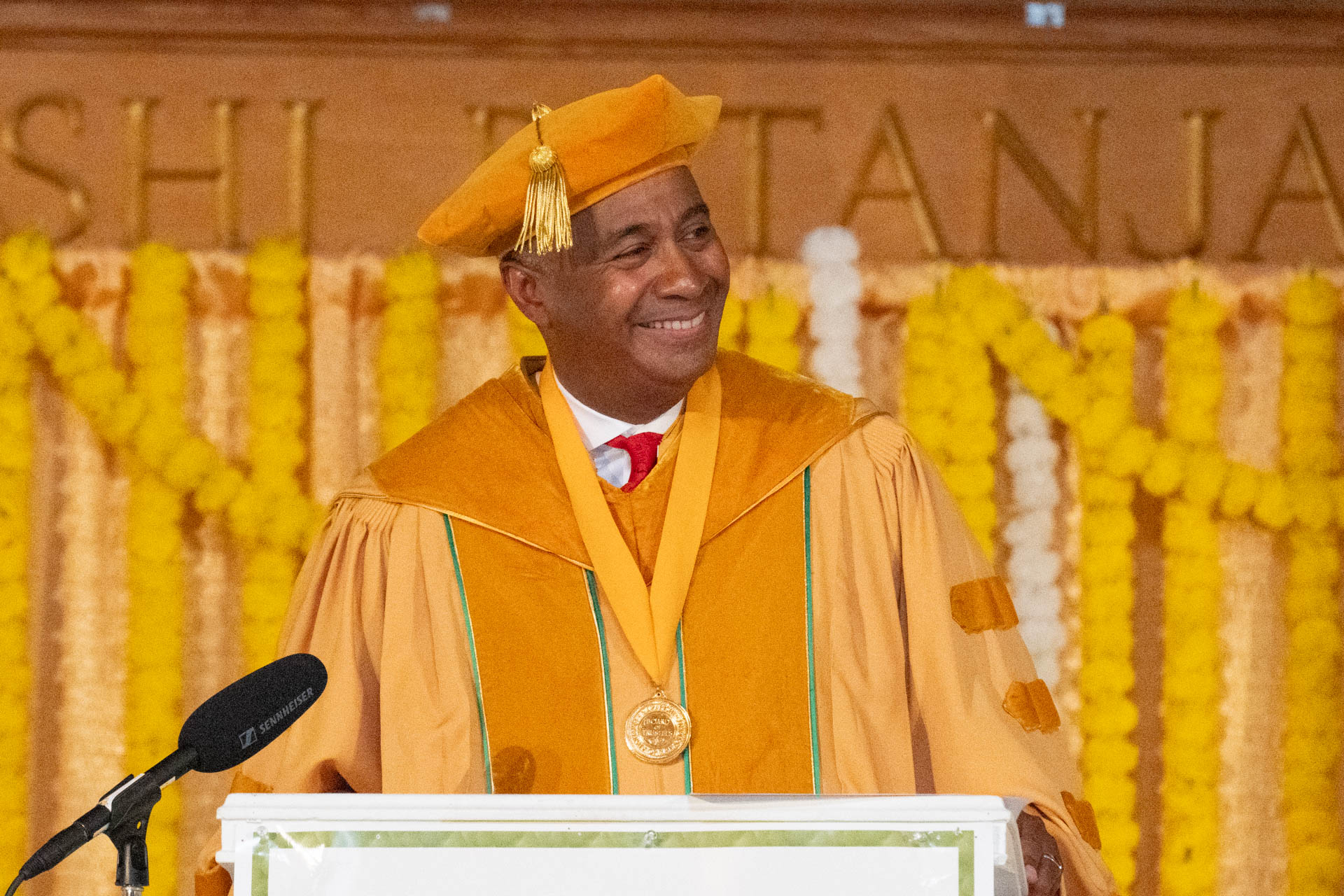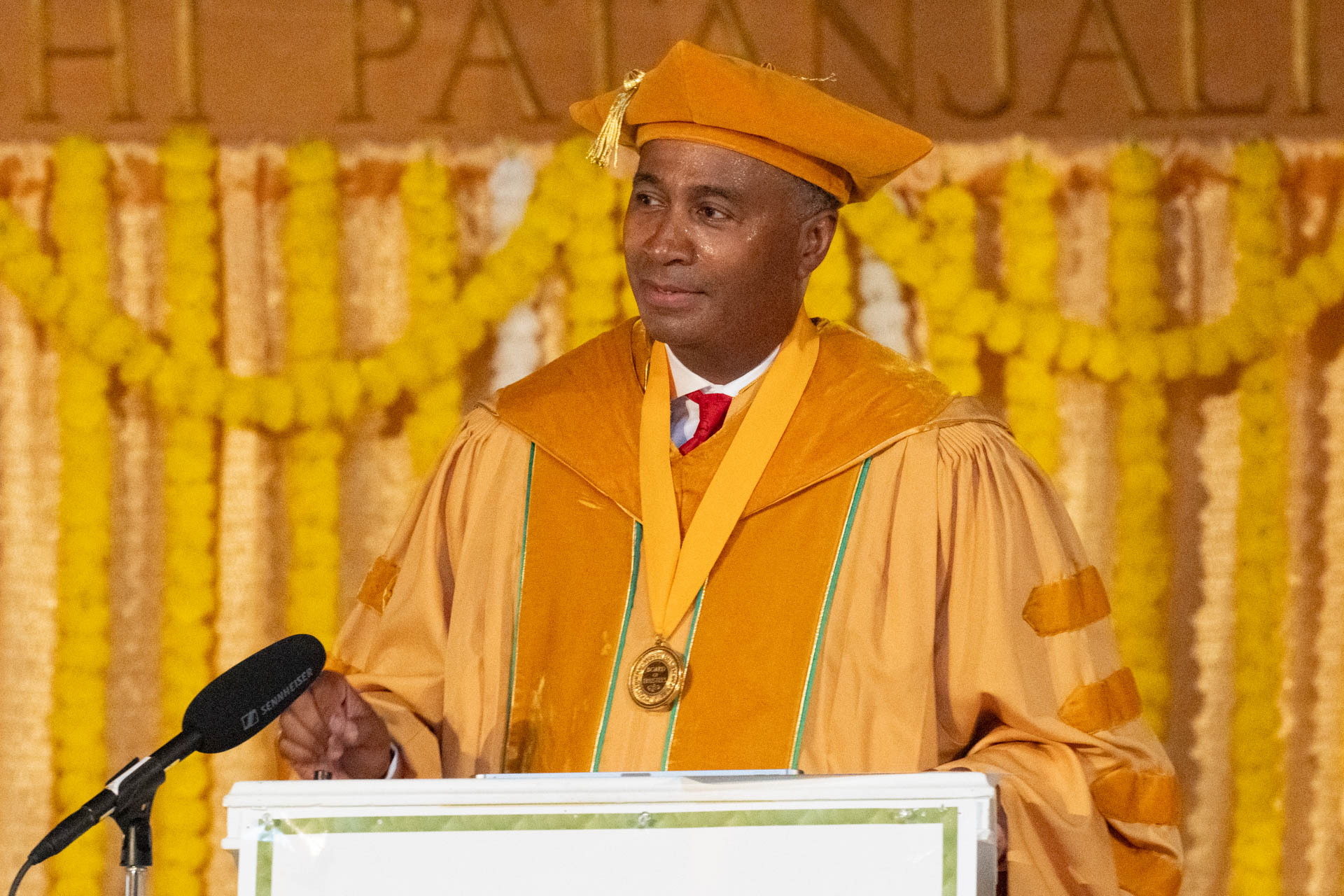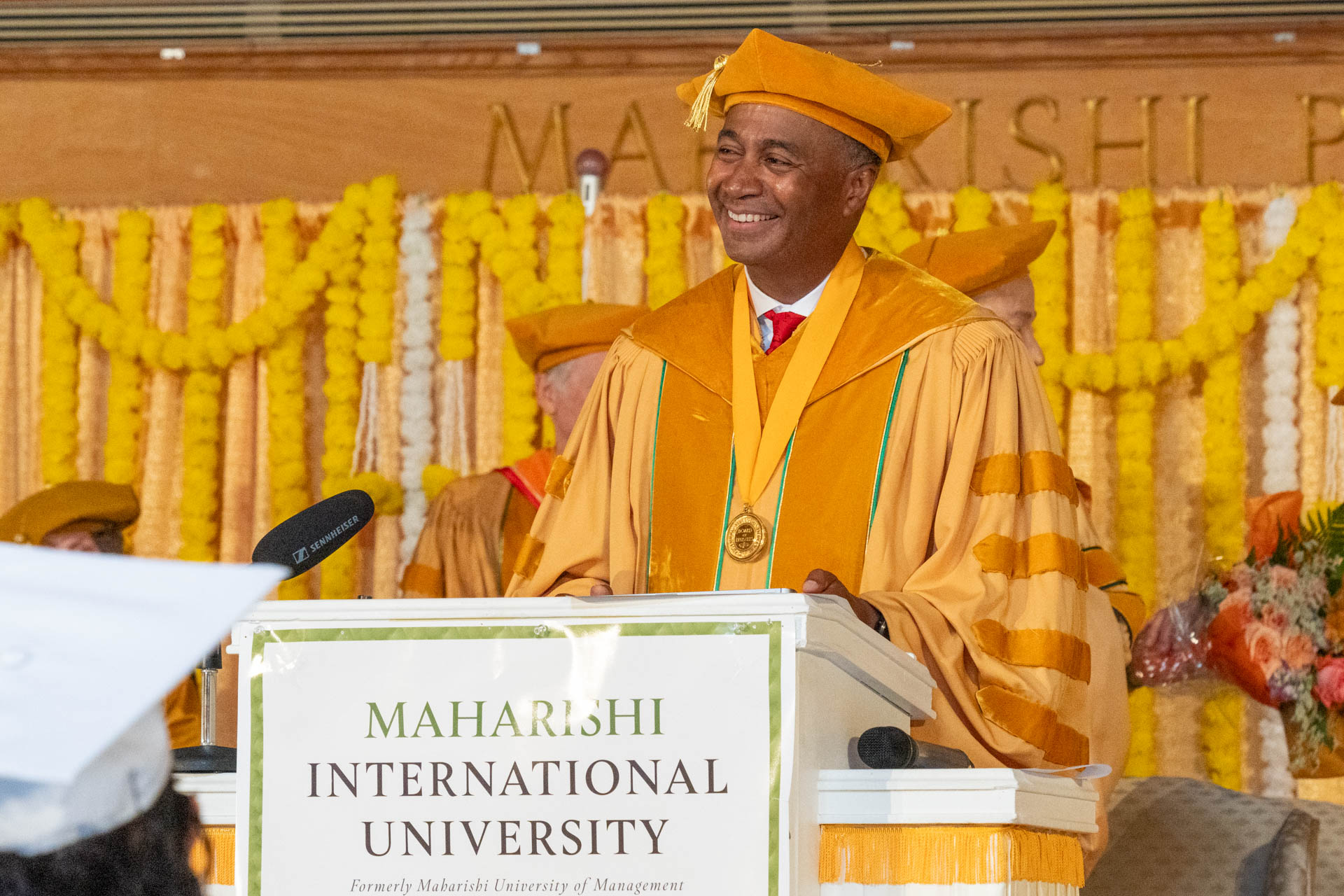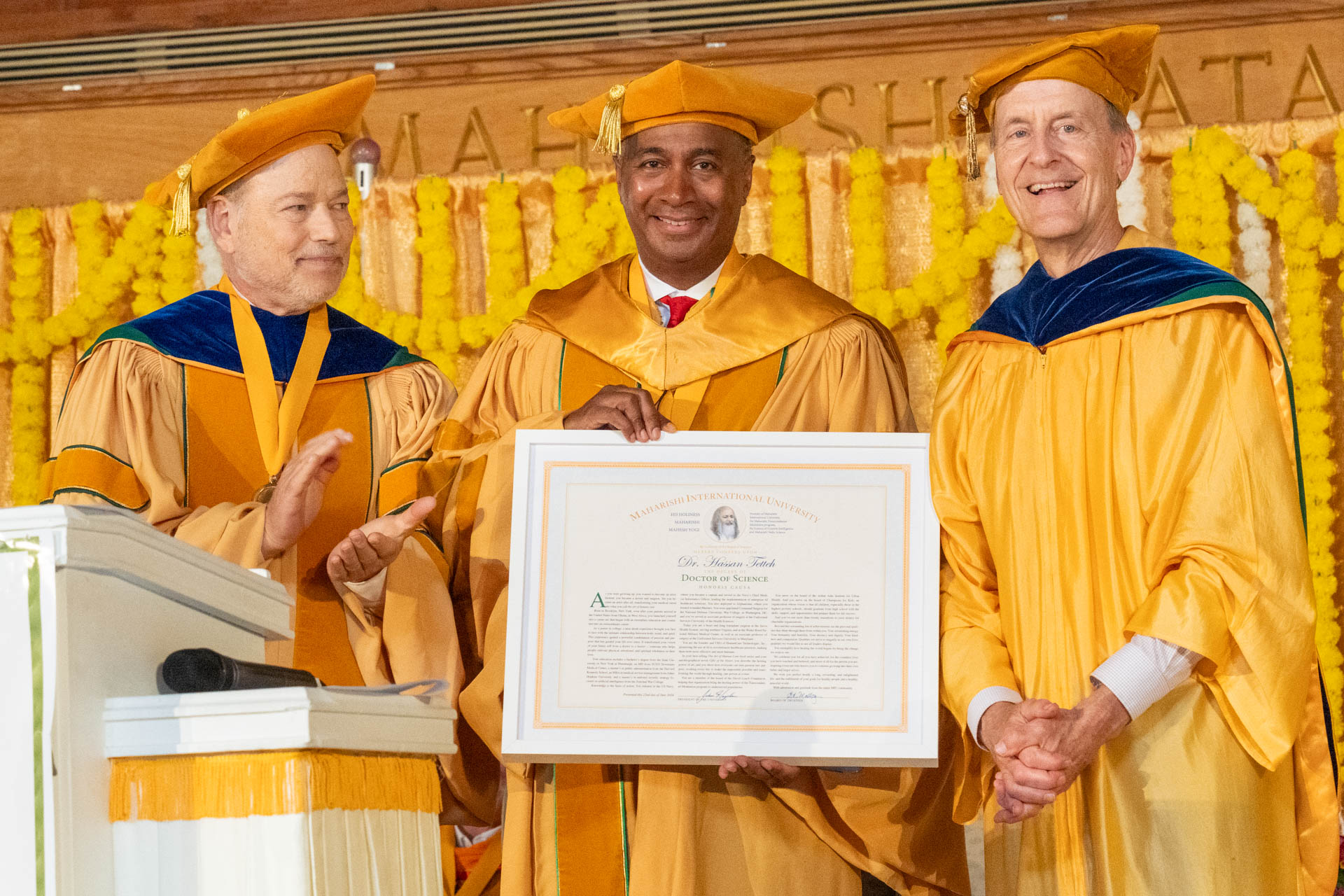
Exceeding expectations: Dr. Hassan Tetteh’s commencement address at MIU – full text
Are you happy?
Before the Gospel according to John and after the gospel, according to Mark, is the gospel according to Luke. And the 48th verse of the 12th chapter of that gospel says, to whom much is given, much is expected.
Your presence here today, under this magnificent Golden Dome, suggests that all of you have received much in life, including the opportunity and the gift to reflect and to meditate. The first part of that passage in Luke, “To whom much is given, much is expected,” is often quoted, but what’s often left out is the end of that paragraph. It says, the more one has been entrusted, the more one will be expected to repay.
President Hagelin, distinguished leaders, faculty, staff, family, and friends, and especially the 2024 graduating class of MIU, get ready to repay.
Unfortunately, life does not accept Visa, MasterCard, or American Express. In this age of entitlements, bailouts, and struggle, there is great opportunity for all of us in the community of meditators to make a difference, effect change, and exceed expectations. This is especially true in the arenas of scholarship, leadership, and service. All educators will attest to the fact that students will rise or fall to the level that is expected of them.

I was born in a small village town in New York called Brooklyn. Some of you in Iowa may have heard of it. I was the son of West African immigrant parents. My mom was from Freetown, Sierra Leone, and my dad was from Makar, Ghana. My dad would say that I was made in the USA. My dad passed away shortly after I graduated from medical school, and my mom passed away just last year, five days after I retired from the military after 25 years of service in the Navy.
My parents, like most immigrant parents, wanted me to be successful. They had sacrificed much and expected me to be successful, become a doctor or a lawyer. To this day, I still try and make them proud. And so I personally learned lessons about expectations and scholarship, leadership, and service, and I developed a greater and deeper understanding of these through the lives of others.
My scholarship and expectation lesson occurred pretty early. When I graduated from high school, I was prepared to go to college and expected to go to Morehouse, where I was accepted. However, I didn’t have enough money to go, and instead, I went to the State University of New York, SUNY Plattsburgh, a small arts and science college far up north by the Canadian border. I was far away from Brooklyn. It was a blessing. Being so far away from civilization, I didn’t have anything to do, so I studied. You guys can relate.
“Is that the best you can do? Doesn’t the scale go up to 4.0?”
After midterms of my freshman year, I made the Dean’s List and proudly went to flaunt my accomplishment to Tim, the admissions counselor. They accepted me to college at 18 years old, full of hubris. I had a 3.5. I slammed my transcript down on his desk. I expected rose petals to be sprinkled before my feet, but instead he looked at me calmly, shrugged his shoulders, and said, “Is that the best you can do? Doesn’t the scale go up to 4.0?” Infuriated, I left his office and worked even harder. I ended the semester with a 3.8 in my freshman year.
My leadership and expectation lessons occurred some years later. On April 29th, 1992, the acquittal of four Los Angeles police officers that were videotaped beating Rodney King, a black man, sparked the LA riots. Fifty-three people died, thousands were injured during six days of chaos, fires, and vandalism that cost the city of LA one billion dollars.
I was 3,000 miles away on the other coast of the country, and tension was very palpable in my community. Emotions were fermenting. In the small college town of Plattsburgh, New York, we reflected on our own individual experiences of injustice growing up in Inner City, New York, and each of us, despite being educated college students, would recall the episodic police harassment we endured in rural Plattsburgh.
“I wasn’t expecting to lead anyone anywhere on that day.”
On the sixth day of the LA riots, over a thousand emotional people gathered for something outside of our small college center. I was called that morning to Miss Janice Saunders’ office, the director of affirmative action. I walked past the gathered movement, and in her office was greeted by campus and community officials who told me I would have to lead the group that gathered outside. I wasn’t expecting to lead anyone anywhere on that day.
My service and expectation lesson occurred even later. After medical school, I joined the Navy, and after general surgery residency, I expected to complete a thoracic surgery fellowship, but the Navy had other plans.
After 9/11, very few surgeons were allowed to go into advanced training and fellowship. Instead, most were deployed, like me. I was assigned to a ship as a ship surgeon. I remember thinking I didn’t join the Navy to go on a ship. I spent 22 months on this ship, and 19 months of those were out to sea. It was the loneliest, most difficult, most stressful time of my life.
Up until that point, it was also the greatest time in my life. I served with 6,000 other volunteers, who all raised their hands, and they were dedicated to a cause and felt the same fears I did.
Years later, I would join thousands of others in a different kind of campaign in the desert of Afghanistan, supporting the Second Marine Expeditionary Forces, Second, MEF. I never expected that on the 10th anniversary of 9/11, after witnessing in real-time the collapse of the World Trade Center, that I would be halfway around the world in Afghanistan, caring for wounded Marines in a tent.
I’ve made lifelong friends in military service and always felt like I was doing my part to preserve the ideals and the freedom of our country that gives its citizens and so many people around the world opportunity.

“Meditation saved my life”
But I want to share how my lessons became a deeper understanding. Meditation saved my life. Meditation saved my life. Let me explain.
When I returned from my deployment in Afghanistan, after taking care of blown-up Marines in a tent, I was in a dark place. While I was in Afghanistan, I would retreat to the tent after our cases. I would journal, I would read. Among my favorite books was the Meditations of Marcus Aurelius. I identified with his retreating to the tent after a long day of battle, to reflect, to have gratitude, to write down the wisdom that he was gaining from seeing these atrocities.
When I returned home, I found a TM center in Bethesda, Maryland. I walked in, and I was greeted by a gentle soul called Mario Orsatti, who taught me TM. TM was the beginning of a whole new life. TM has helped me grow, increase my creativity, be a better father, be a better husband, be a better physician, be a better surgeon, and gave me peace.
One of my favorite authors once said, when you pray, you talk to the universe; when you meditate, you listen to the universe.
Last night at the graduation awards ceremony here at MIU, I was so inspired by the talented and gifted students that I’m sure are just representative of the entire class that’s here now and all your alumni in the community of MIU. Meditate and create. It’s a beautiful thing.
“Through meditation, I discovered sort of a practical education.”
My lessons were only the beginning of a deeper understanding. Through meditation, I discovered sort of a practical education. Education is like a garden snake that swallows a chicken egg. It’s in you but takes some time to digest. You know what I mean.
The experiences I had and my expectations were placed into perspective in the areas of scholarship, leadership, and service. I developed a deeper scholarship and expectation understanding.
While studying for my general surgery boards, I came across a quote of a young man from 1880. He was studying at Chicago Medical School. He said, “I’m making fair progress. I think it’s hard work and much study, but I’m up in the front rank and keep neck and neck with the leaders.”
The words of Dr. Daniel Hale Williams resonated with me. He was the first African American to be a fellow and charter member of the American College of Surgery, and among the first surgeons credited with performing successful surgery on the heart decades before cardiopulmonary bypass was even a possibility. His expectations were best summed up in his words: “If you don’t aim at something, you may go seeking, but you’ll come back without a thing.”
“Make sure you aim for something in life.”
Class of 2024, make sure you aim for something in life. Dr. Williams was directly responsible for training an entire generation of surgeons, and influenced hundreds, perhaps thousands, including me, to be clinically excellent. I thought about what Dr. Williams would have said to me if I smugly brought him my 3.5 GPA.
I developed a deeper leadership and expectation understanding by recounting a story. On December 1, 1955, Miss Rosa Parks refused to move and go to the back of the bus. She was subsequently arrested and convicted and became a historic icon.
Shortly after Rosa Parks’ trial and conviction, a young man who had just arrived in Montgomery had left a crowded, angry courtroom and headed to a meeting across town with some community officials. The Montgomery bus boycott was just an embryonic movement, and people were gathered to name a leader for the MIA, the Montgomery Improvement Association.
As soon as nominations were open, Mr. Rufus Lewis said, “Mr. Chairman, I’d like to nominate Reverend M.L. King for President.” Dr. King later wrote about the event in his autobiography: “The action caught me unawares. It happened so quickly. I didn’t even have time to think it through. It is possible and probable that if I had, I would have declined the nomination.”
“I stared out the window to the sea of faces gathered, waiting for something.”
In my moment in 1992 in Miss Saunders’ office, I too passed an angry crowd. I felt tremendous fear and uncertainty. I stared out the window to the sea of faces gathered, waiting for something.
Class of 2024, as Marcus Aurelius said, you have power over your mind, not outside events. Realize this, and you will always find strength and courage.
I was nominated to lead, and the action caught me unawares. When I answered “Yes” on that day, I did not realize a movement had been started. When Dr. King accepted the nomination in December of 1955, a movement was started that would gain national recognition and change history forever.
I finally developed a deeper service and expectation understanding. In the 1940s, a Jewish psychiatrist was imprisoned in an Auschwitz concentration camp. He was prisoner 119104, and he expected to die. However, over time the doctor began to find meaning in his fellow prisoners’ circumstances. He provided service to his fellow inmates. He encouraged them to have hope, to have hope for the future because they were still alive. He even quoted Nietzsche: “That which does not kill me makes me stronger.” The service he provided to his fellow prisoners undoubtedly helped, but his greatest service was the contribution he made to mankind. Dr. Viktor Frankl, number 119104, gave us logotherapy and the book Man’s Search for Meaning.
“You will find purpose and meaning when you serve others.”
Class of 2024, you will find purpose and meaning when you serve others. You will find purpose and meaning when you serve others. Dr. Frankl helped me to understand that it did not really matter what I expected from life, but rather what did matter is what life expected from me.
Facing Tim’s challenges, leading a Rodney King rally, or serving on the ship or in the desert of Afghanistan was not necessarily what I expected, but it was in those moments in life what life expected of me.
The greatest among us all rise and exceed all expectations because they leave a legacy, they embrace life, they become engaged, and they take on obstacles as opportunities.
“It does not matter what you expect from life, but what does matter is what life expects from you.”
Dr. Daniel Hale Williams, Dr. King, and Dr. Frankl all faced circumstances that did not consider what they expected from life, but instead, they all rose to the occasion of what life expected of them. Class of 2024, it does not matter what you expect from life, but what does matter is what life expects from you.
You all have been given the great gift of a consciousness-based education and so much more. Indeed, much is expected of you. You are all expected to exceed expectations. So, as I close, you might say, “Well, how do I exceed expectations?” I’ll give you three steps.
Number one, you will exceed expectations when you dedicate your life to answering life’s most urgent question. Dedicate your life to answering life’s most urgent question. What is that question? The question is, what are you doing for others? What are you doing for others?
Number two, you will exceed expectations when you expect to have challenges and view them all as opportunities and understand that which does not kill you makes you stronger.
And number three, you will exceed expectations when you are all grateful to the people who helped you along the way.
So, class of 2024, let’s start exceeding expectations right now. Please stand and join me in giving your families, friends, faculty, and staff a standing ovation of gratitude.
I guarantee you your parents were not expecting that.
Professor Jacques Barzun, considered among the greatest literary scholars from Columbia University, died at the age of 104. He once said, “In teaching, you cannot see the fruit of a day’s work. It’s invisible and remains so for many years.”
“You are, every one of you, someone’s favorite unfolding story.”
Graduates, I’m going to give you some great advice here. Write to your teachers and mentors and let them know how you’re doing when you leave this hallowed place. Show and tell them of the fruit of their labor. You are, every one of you, someone’s favorite unfolding story. You are. Each one of you is someone’s favorite unfolding story. Tell them how the story’s going.
In this critical time, the world needs consciousness-based individuals to positively change the world. We need you. I especially expect you all to exceed expectations. Congratulations!

